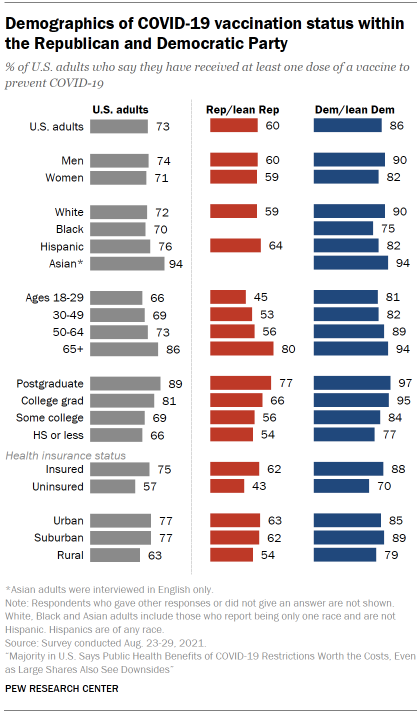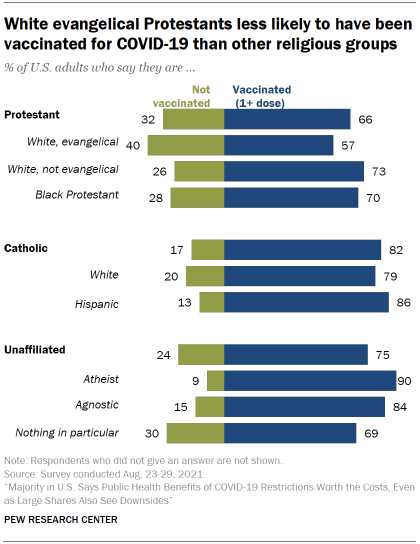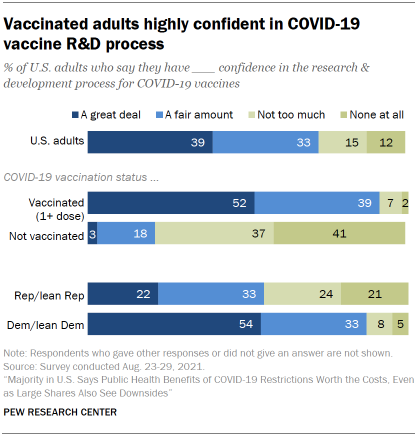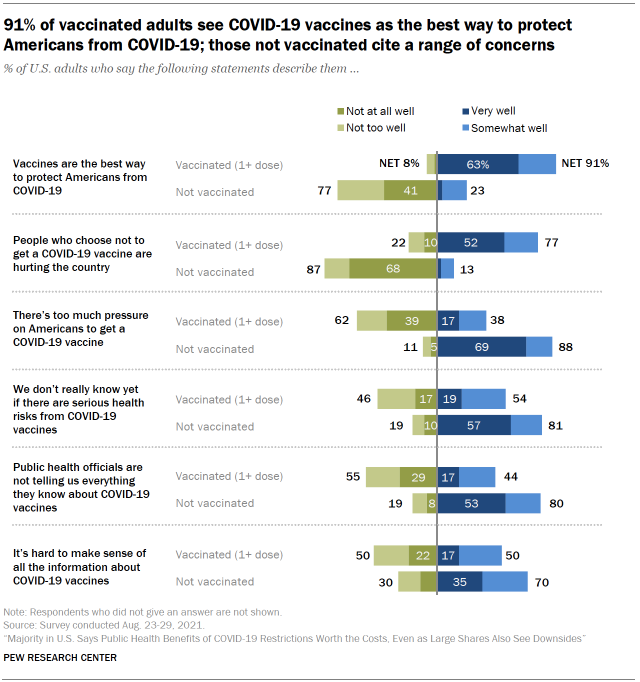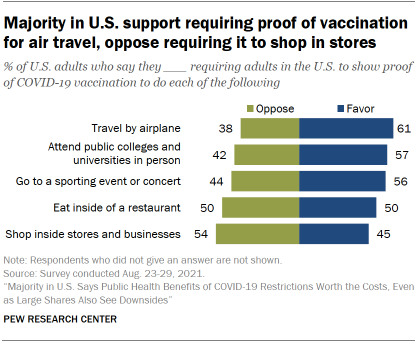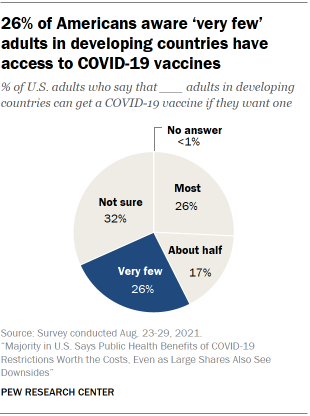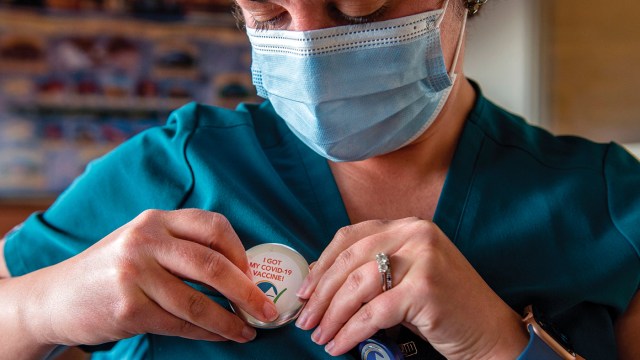
The coronavirus pandemic has claimed more than 670,000 lives in the United States as of Sept. 20, and the spread of the highly transmissible delta variant has added new urgency to the federal government’s efforts to vaccinate all Americans against the virus. As the drive to inoculate more people continues, here are 10 facts about Americans and COVID-19 vaccines, based on an August Pew Research Center survey of more than 10,000 U.S. adults.
Pew Research Center published this analysis to examine how COVID-19 vaccination patterns in the United States differ by demographic, religious and political factors, and to assess broader public attitudes on key questions related to coronavirus vaccines. The findings in this analysis are based primarily on a survey of 10,348 U.S. adults, conducted from Aug. 23 to 29, 2021.
Everyone who took part in the survey is a member of Pew Research Center’s American Trends Panel (ATP), an online survey panel that is recruited through national, random sampling of residential addresses. This way, nearly all U.S. adults have a chance of selection. The survey is weighted to be representative of the U.S. adult population by gender, race, ethnicity, partisan affiliation, education and other categories. Read more about the ATP’s methodology. Here are the questions asked in the August survey, along with responses, and its methodology.
Around three-quarters of U.S. adults (73%) said in August that they had received at least one dose of a COVID-19 vaccine, with the vast majority in this group saying they were fully vaccinated. The survey findings align closely with administrative data from the Centers of Disease Control and Prevention, which, as of early September, showed that three-quarters of adults had received at least one vaccine dose. Surveys have generally aligned closely with the CDC’s vaccination data.
Democrats are far more likely than Republicans to have received at least one COVID-19 vaccine dose, though majorities in both groups say they have done so. Among Democrats and independents who lean to the Democratic Party, 86% said they were at least partially vaccinated as of August, compared with six-in-ten Republicans and GOP leaners. Factoring in ideology as well as party affiliation, nine-in-ten self-described liberal Democrats said they had received at least one dose, compared with 83% of conservative or moderate Democrats, 63% of moderate or liberal Republicans and 58% of conservative Republicans.
In both parties, older people and those with higher levels of education are more likely to have received at least one dose. As of August, 86% of Americans ages 65 and older said they were at least partially vaccinated, compared with 73% of those ages 50 to 64, 69% of those 30 to 49 and 66% of those 18 to 29. Older Americans were among the first groups to become eligible for COVID-19 vaccines due to the increased risk of severe illness they face from the virus.
Americans with more formal schooling are also more likely to be vaccinated. Around nine-in-ten of those with a postgraduate degree or more (89%) said they had received at least one dose by August, compared with smaller shares of those with a bachelor’s degree (81%), some college education (69%) or a high school diploma or less (66%).
These patterns appear in both partisan coalitions. Among Republicans, for example, 80% of those ages 65 and older said they had received at least one dose by August – far higher than the share of younger Republicans who had done so.
Unlike earlier in the pandemic, Black and White adults are about equally likely to say they have been vaccinated. Around seven-in-ten Black and White Americans (70% and 72%, respectively) said they had received at least one vaccine dose as of August. Earlier in the outbreak, Black adults were less likely than White adults to say they planned to get a COVID-19 vaccine or had already done so.
Other major racial and ethnic groups also reported high vaccination rates in the August survey. Around three-quarters of Hispanic adults (76%) said they were at least partially vaccinated, as did 94% of Asian adults. It’s important to note, however, that Asian adults were surveyed in English only and may not necessarily be representative of all Asian Americans.
Vaccination patterns vary considerably among major U.S. religious groups. Around eight-in-ten Catholic adults (82%) said they were at least partially vaccinated as of August – a figure that included 86% of Hispanic Catholics and 79% of White Catholics. Among Protestants, 73% of White non-evangelicals and 70% of those who are Black said they had received at least dose, but the share was considerably lower among White evangelical Protestants (57%).
When it comes to religiously unaffiliated Americans, three-quarters said they were at least partially vaccinated as of August. But there were differences within this group too: Nine-in-ten atheists said they had received at least one dose, compared with somewhat smaller shares of agnostics (84%) and those who describe their religion as “nothing in particular” (69%).
Vaccination status is strongly linked with confidence in the vaccine research and development process. Around nine-in-ten adults who were at least partially vaccinated as of August (91%) said they had a great deal or fair amount of confidence in the vaccine R&D process, compared with only 21% of those who were not vaccinated. Only 3% of unvaccinated adults said they had a great deal of confidence in the vaccine R&D process.
Americans who are not inoculated against COVID-19 express a range of concerns about the vaccines. The August survey asked Americans whether various statements about COVID-19 vaccines describe them very well, somewhat well, not too well or not at all well. At least eight-in-ten unvaccinated adults said the following statements describe them very or somewhat well: “There’s too much pressure on Americans to get a COVID-19 vaccine” (88%); “We don’t really know yet if there are serious health risks from COVID-19 vaccines” (81%); and “Public health officials are not telling us everything they know about COVID-19 vaccines” (80%). Seven-in-ten unvaccinated adults also said the following statement describes them very or somewhat well: “It’s hard to make sense of all the information about COVID-19 vaccines.”
The survey also asked Americans for their reactions to changing public health guidance around some aspects of the pandemic, including information about how the virus spreads and how effective masks are in limiting its spread. Three-quarters or more of unvaccinated Americans expressed negative reactions to the changing guidance, such as by saying it made them wonder if public health officials were holding back important information (78%) and that it made them less confident in public health officials’ recommendations (75%).
Most vaccinated Americans – but not all – say they would probably get a booster shot if recommended by public health officials. The U.S. Food and Drug Administration recently approved an additional dose of a COVID-19 vaccine for Americans with weakened immune systems, and booster shots could be in the works for a broader swath of the public, too. In August, a large majority of vaccinated adults – amounting to 62% of all U.S. adults – said they would probably get a vaccine booster if recommended. But a small segment of vaccinated adults – amounting to 10% of all adults – said they would probably not get a booster shot.
Americans have mixed views about vaccine requirements in public places. Majorities said in August that they favor requiring adults to show proof of COVID-19 vaccination to travel by airplane (61%), attend public colleges and universities in person (57%) and go to a sporting event or concert (56%). But the public was evenly divided over such a requirement for eating inside a restaurant (50% favored it, 50% opposed it), and slightly more likely to oppose than favor proof of vaccination for shopping inside stores and businesses (54% vs. 45%).
Americans’ views on these questions were closely linked to party affiliation: Majorities of Democrats favored requiring proof of vaccination in each of these five settings, while majorities of Republicans were opposed in all five cases. Public attitudes were also tied to vaccination status, with majorities of vaccinated adults favoring proof of vaccination in all five settings and unvaccinated adults overwhelmingly opposed.
The public was also divided over how U.S. businesses should approach vaccinations. Around four-in-ten adults (39%) said most businesses should require employees to get a COVID-19 vaccine, while 35% say businesses should encourage but not require it. A quarter of adults said businesses should neither require nor encourage it. Here, too, views were linked to party affiliation and vaccination status. The survey was conducted before President Joe Biden announced that employers with more than 100 workers would be required to have their employees vaccinated or tested weekly for COVID-19.
Few Americans know there is little access to COVID-19 vaccines in developing countries – and few say it should be a top priority for the U.S. to provide such nations with large numbers of vaccines. Only around a quarter of U.S. adults (26%) correctly said in August that very few people in developing countries have access to coronavirus vaccines.
On a separate question, 26% of adults said it should be a top priority for the U.S. to provide large numbers of COVID-19 vaccines to developing countries. Around half (49%) said it should be an important priority but not a top priority, while 23% said that it should be a lower priority or that it should not be done at all. Democrats were more than three times as likely as Republicans to say it should be a top priority for the U.S. to provide large numbers of vaccines to developing countries (39% vs. 11%); Republicans, in turn, were roughly four times as likely as Democrats to say it should be a lower priority or should not be done at all (40% vs. 9%).
Note: This is an update of a post originally published March 23, 2021. Here are the questions asked in the August survey, along with responses, and its methodology.
